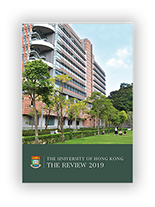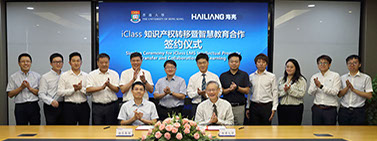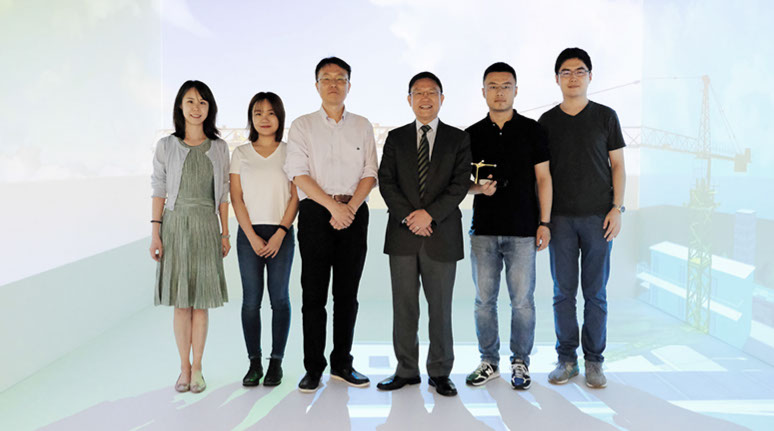Knowledge Exchange and Technology Transfer
2018_%20.png?crc=3873734352)
PDF Version
Past Issues
Vision and Mission
An Extract from
the University’s
Annual Accounts 2018–19
The University Profile
Officers of the University
The Court
Teaching and Learning
Research and Innovation
Knowledge Exchange and
Technology Transfer
Message from the
President and
Vice-Chancellor
E-Book

Spotlight on Innovators
New inventions and deep technological expertise are in high demand in the community, where HKU scholars have had increasing success by applying and sharing their outputs.
Problem-solving Inventions

HKU won five gold and five silver medals at the 47th International Exhibition of Inventions of Geneva in 2019.
HKU scientists performed strongly at the 47th International Exhibition of Inventions of Geneva in 2019, one of the most prestigious events of its kind, earning 10 medals in total, including one gold medal with the congratulations of the jury, four gold medals and five silver medals.
Flectrode Ltd, an HKU spin-off company founded by Dr Wendi Li and Dr Tony Feng in the Department of Mechanical Engineering, was awarded the gold medal with the congratulations of the jury for the transparent conducting film that the scholars developed, which has application for emerging electronics such as displays and solar batteries. The film can produce 100 times better conductivity than existing technology and improve photovoltaic efficiency in solar cells so more electricity is produced from light, including artificial light. The invention has been licensed exclusively to Flectrode Ltd and will start mass production at its Xiamen production facility by the end of 2019.
Another HKU winner was a water filter membrane that is compact enough to fit into a pocket, can filter various contaminants including both heavy metals and bacteria, and does not require electricity for use. The gold award-winning nanofibrous membrane, developed by a research team led by Professor Tang Chuyang in the Department of Civil Engineering, has been patented in the US and China. The membrane was initially developed as a solution for providing clean, drinkable water in the aftermath of disasters such as earthquakes and tsunamis, but it can also be used for household water and portable water filtration. The device is expected to be 30–50% cheaper than carbon filters on the market and deliver safe drinkable water in less than one minute.
iCLASS Goes to Market
An electronic learning platform developed by Dr Wilton Fok and his team in the Department of Electrical and Electronic Engineering has been picked up by the Hailiang Group, a large education group that is publicly listed in the US, which also plans to collaborate with HKU on new areas of online learning and information technology in education, such as artificial intelligence, educational big data and an intelligent question bank.
The iClass Learning Management System, which is a mobile interactive learning platform, was developed by HKU’s e-Learning Development Laboratory in the wake of the 2008 Sichuan earthquake to provide reconstructed schools with e-learning resources. It has been refined over the years to include functions such as multimedia, big data and intelligent assessment, and to allow easy interactivity between students and teachers. iClass has also been adopted by many schools in Hong Kong, Mainland China and overseas. HKU’s wholly owned technology transfer arm, Versitech Ltd, signed the agreement with Hailiang, which plans to expand the reach of the iClass platform.
Dr Fok is also involved in the development of Artificial Intelligence (AI) technology. His team in the Sport AI Lab (SAIL) was awarded $3.9 million from the Innovation and Technology Bureau’s Innovation and Technology Fund for Better Living for the project ‘Artificial Intelligence for Swimmer Safety and Performance Analysis System’. This technology will be able to detect drowning and send out an alert alarm, as well as help coaches analyse their swimmers’ techniques. The system will be deployed in Munsang College and Fung Kai No.1 Primary School in Hong Kong in 2020.

HKU and Hailiang Education Group signed a Memorandum of Understanding for the sales agreement of the iClass Learning Management System.
A Better Way to Build
The construction industry faces major challenges due to an ageing workforce, labour shortage, and safety and other concerns. But there is a solution in the form of Modular Integrated Construction (MiC), which uses new technology and off-site pre-assembly to reduce the cost, wastage and time involved in building construction and is also safer than conventional methods.
Dr Pan Wei, Executive Director of the Centre for Innovation in Construction and Infrastructure Development, has been a leader in investigating MiC’s applicability in Hong Kong and his work formed the basis of an MiC strategy paper published in 2019 that was supported by the Development Bureau. The Hong Kong government has already started piloting MiC in several public projects, including the Disciplined Services Quarters for the Fire Services Department in Pak Shing Kok. HKU is also using it in the construction of a new student residence in Wong Chuk Hang to accommodate more than 1,200 students and staff. Dr Pan estimates MiC can reduce local construction costs by up to 20% and shorten construction time by up to 50%.
“I believe MiC is the future of construction technology because it is capable of dealing with various problems, such as labour shortages, land use limitations and severe weather challenges,” he said – all of which are present in Hong Kong.

Dr Pan Wei (third from right) and his team in the Cave Automatic Virtual Environment (CAVE) laboratory.